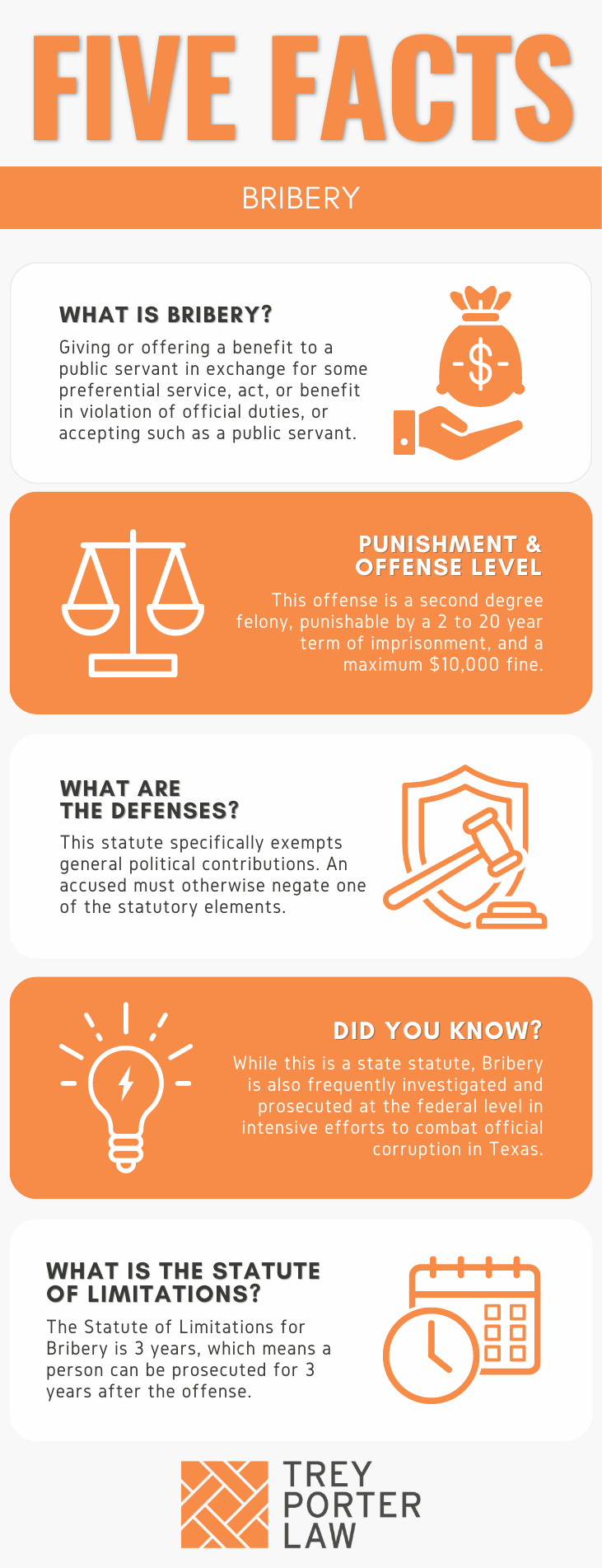WHAT IS BRIBERY IN TEXAS?
The Texas law against bribery prohibits conferring or offering to confer a benefit upon a public servant as consideration for violating one of his or her duties.

WHAT IS THE BRIBERY LAW IN TEXAS?
Tex. Penal Code § 36.02. BRIBERY.
(a) A person commits an offense if he intentionally or knowingly offers, confers, or agrees to confer on another, or solicits, accepts, or agrees to accept from another:
(1) any benefit as consideration for the recipient’s decision, opinion, recommendation, vote, or other exercise of discretion as a public servant, party official, or voter;
(2) any benefit as consideration for the recipient’s decision, vote, recommendation, or other exercise of official discretion in a judicial or administrative proceeding;
(3) any benefit as consideration for a violation of a duty imposed by law on a public servant or party official; or
(4) any benefit that is a political contribution as defined by Title 15, Election Code, or that is an expenditure made and reported in accordance with Chapter 305, Government Code, if the benefit was offered, conferred, solicited, accepted, or agreed to pursuant to an express agreement to take or withhold a specific exercise of official discretion if such exercise of official discretion would not have been taken or withheld but for the benefit; notwithstanding any rule of evidence or jury instruction allowing factual inferences in the absence of certain evidence, direct evidence of the express agreement shall be required in any prosecution under this subdivision.
(b) It is no defense to prosecution under this section that a person whom the actor sought to influence was not qualified to act in the desired way whether because he had not yet assumed office or he lacked jurisdiction or for any other reason.
(c) It is no defense to prosecution under this section that the benefit is not offered or conferred or that the benefit is not solicited or accepted until after:
(1) the decision, opinion, recommendation, vote, or other exercise of discretion has occurred; or
(2) the public servant ceases to be a public servant.
(d) It is an exception to the application of Subdivisions (1), (2), and (3) of Subsection (a) that the benefit is a political contribution as defined by Title 15, Election Code, or an expenditure made and reported in accordance with Chapter 305, Government Code.
(e) An offense under this section is a felony of the second degree.
WHAT IS THE PENALTY CLASS FOR BRIBERY IN TEXAS?
Bribery is a second degree felony, punishable by two to 20 years in prison.
WHAT IS THE PUNISHMENT RANGE FOR BRIBERY IN TEXAS?
Bribery, a second degree felony, carries between two and 20 years in prison, and up to a $10,000 fine.
WHAT ARE THE PENALTIES FOR BRIBERY IN TEXAS?
A person charged with bribery may be eligible for probation after a conviction, or deferred adjudication without a conviction, for a period not to exceed ten years.
WHAT ARE THE DEFENSES TO BRIBERY IN TEXAS?
The bribery statute specifically exempts political contributions, as long as the contributions were not accepted in exchange for agreeing to take or withhold a specific exercise of official discretion. This means a person who makes or accepts political contributions may not be charged with bribery, unless the prosecution can prove the contribution was offered and accepted in exchange for the candidate’s agreement to take a specific action in their official capacity.
WHAT IS THE STATUTE OF LIMITATIONS FOR BRIBERY IN TEXAS?
The limitation period for bribery, a second degree felony, is three years.
BRIBERY IN TEXAS
Bribery under Texas law requires the knowing or intentional giving of a benefit as consideration for the recipient’s decision, opinion, recommendation, vote, or other exercise of discretion as a public servant.
TEXAS BRIBERY COURT CASES
The case law regarding bribery in Texas shows the difficulty in proving bribery cases, especially in the context of political contributions.
The Court of Criminal Appeals recently discussed political contributions in Cary v. State. The defendant’s husband was involved in a child custody dispute with his ex-wife, and a local judge ruled against him. The defendant hired a “consultant,” who convinced another to run against the judge. Through the consultant, she made campaign contributions to the judicial candidate. She was charged with bribery, and convicted after the State argued she gave the candidate money in exchange for a favorable ruling on her husband’s case. But the conviction was overturned, because the CCA found nothing disproving they were campaign contributions. 507 S.W.3d 750 (Tex. Crim. App. 2016).
In other situations, the nature of the bribe is more readily apparent. For example, a judge with the authority to set bonds accepted $500 in exchange for lowering the bonds of two inmates from $30,000 to $5,000 each. He was convicted of bribery, and the appellate court affirmed. Based on the judge’s actions surrounding the bond change, it was evident he accepted money to confer a benefit on the inmates as consideration for violating his legal duty to set bonds. Zarate v. State, 551 S.W.3d 261 (Tex. App—San Antonio 2018, pet. ref’d).
















